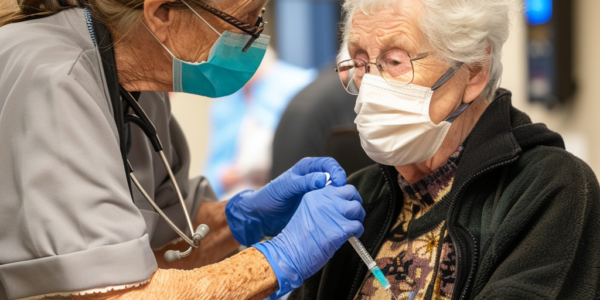New Insights into Drug-Resistant Prostate Cancer
New research from the University of Eastern Finland sheds light on combatting drug-resistant prostate cancer by targeting the glucocorticoid receptor. Limiting the activity of coregulator proteins could prevent the development of drug resistance, offering potential new treatment strategies for this challenging cancer type.
NHS to Open Booking Service for Spring Covid Booster Jab
The NHS in England is opening a booking service for the spring Covid booster jab for individuals aged 75 or older and those with weakened immune systems. Bookings can be made through the NHS website, app, or by calling 119. The spring vaccine will utilize Pfizer-BioNTech or Moderna mRNA vaccines, which have been updated to provide protection against more recent Covid variants. Private availability of the Covid jab is anticipated from 2024, making it crucial for eligible individuals to take advantage of this opportunity to enhance their immunity against the ongoing threat of Covid-19.
Mouth Bacterium Found in 50% of Colorectal Cancer Tumors
New research reveals a potential link between a bacterium commonly found in the mouth and colorectal cancer, with a specific subtype present in 50% of tumors. This discovery could lead to new screening, prevention, and treatment methods for the disease, offering hope for improved outcomes for patients. The study, published in Nature, highlights the need for innovative approaches to combat colorectal cancer, which has been on the rise in recent years. Understanding the specific subtypes of the bacterium could provide valuable insights into its impact on cancer and potential for targeted treatment.
Treating Gum Disease May Lower Risk of Irregular Heart Rate
Treating gum disease may lower the risk of atrial fibrillation reoccurring, according to a new study. Researchers found that those whose gum disease was treated after ablation were 61% less likely to experience a reoccurrence. The study measured elevated levels of inflammatory proteins in the blood of participants with severe gum disease, and higher levels of antibodies for gum disease-related bacteria were linked to greater atrial fibrillation reoccurrence. The team encourages people with atrial fibrillation to seek treatment for gum disease if necessary, emphasizing preventive measures such as brushing with fluoride toothpaste at least twice a day, daily flossing or using interdental sticks, and regular dental check-ups.
Bird Flu Outbreak in Cattle Raises Concerns for Humans
Bird flu outbreak in dairy cattle raises concerns about potential risks to humans. Researchers are monitoring for mutations that could make the virus a threat to humans. Federal health officials suspect ‘mechanical transmission’ during milking may be spreading the virus. Genetic sequencing shows potential evolution to better replicate inside mammals, raising concerns about the virus evolving to infect humans more easily.
The Potential of Ketamine in Mental Health Treatment
Learn about the potential of ketamine for treating treatment-resistant depression and other mental health conditions. Although not yet FDA-approved, ketamine and its relative esketamine show promise in relieving depression symptoms. However, concerns about long-term efficacy and safety have been raised. Explore the availability of unsupervised ketamine treatment and the importance of evidence-based practices for patient safety. Discover the safety protocols and personalized treatment plans involved in ketamine infusion therapy at Being Health.
Clemson University Researchers Shed Light on Personalized Medicine
Clemson University researchers Trudy Mackay and Robert Anholt have published a review paper on pleiotropy and epistasis, shedding light on the complex aspects of human genetic traits. Their aim is to provide a comprehensive framework for the development of precision medicine, highlighting the prevalence of pleiotropy in model organisms and the often overlooked non-additive gene-gene interactions of epistasis. By addressing the limitations of previous medical studies, the researchers hope to pave the way for new approaches in personalized medicine.
Discovery: Aldehydes Linked to DNA Damage and Premature Aging
A team of researchers at Nagoya University in Japan has discovered the impact of aldehydes on DNA damage and aging. Their findings shed light on the association between aldehydes and premature aging diseases, as well as potential strategies to mitigate aging in healthy individuals. The study revealed that aldehydes, metabolic byproducts, are linked to premature aging, emphasizing the importance of controlling exposure to aldehyde-inducing substances such as alcohol, pollution, and smoke. The researchers highlighted the relationship between aldehyde-derived DNA damage and premature aging, emphasizing the significance of ALDH2 in converting aldehydes into non-toxic substances. The study utilized a method called DPC-seq to investigate the link between aldehyde accumulation and DNA damage in premature-aging disease patients, identifying key processes involved in the removal of formaldehyde-induced DPCs. Professor Ogi expressed optimism about the implications of their findings, emphasizing the potential for developing strategies to combat premature aging diseases and mitigate aging in healthy individuals.
Timing of Exercise and Cardiovascular Health
New research from the University of Sydney suggests that evening exercise may have significant health benefits, particularly for cardiovascular health. A study of over 30,000 volunteers found that evening exercisers had the lowest risk of developing cardiovascular disease and of dying in general, even after accounting for factors like age or smoking history. This adds to the ongoing debate over whether physical activity can be more beneficial at certain times of the day, providing evidence that evening exercise might offer better heart and health benefits.
Murray Valley Encephalitis Detected in Western Australia’s Pilbara Region
Murray Valley encephalitis (MVE) has been detected in the Pilbara region of Western Australia, raising concerns among health authorities. Dr. Andrew Jardine emphasized the importance of taking precautions to reduce the risk of MVE by protecting against mosquito bites. The initial symptoms of MVE include fever, drowsiness, headache, stiff neck, nausea, and dizziness. Health authorities provided a list of preventive measures to minimize the risk of mosquito bites, including avoiding outdoor activities during peak mosquito hours, wearing suitable clothing, using mosquito repellent, ensuring the installation of insect screens, and maintaining short vegetation around homes.
























